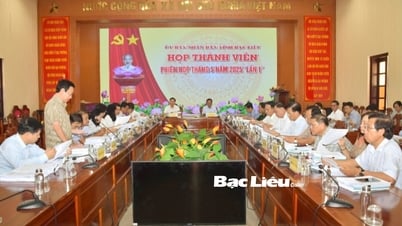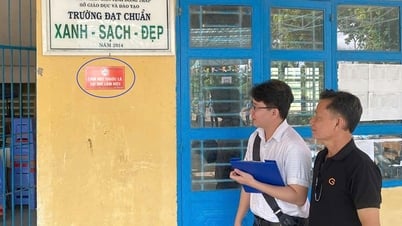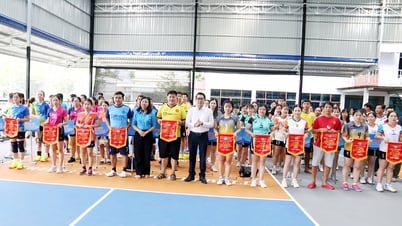 |
| Donating food safety tools. Photo: ILRI |
Vietnam has a rich culinary heritage, with pork being a staple in the daily diet of its people. However, a recent survey conducted by the International Livestock Research Institute (ILRI) and its partners in several northern provinces found relatively high levels of microbiological contamination, with more than 60% of pork samples from traditional markets contaminated with Salmonella. This fact raises an urgent need for action to protect consumer health.
Faced with this situation, OHI conducted controlled random sampling at 68 traditional markets in 5 provinces and cities including Hanoi , Thai Nguyen, Thua Thien Hue, Dong Nai and Can Tho. The survey and sampling activities for this study were conducted from October 2023 to June 2024. The project applied a three-factor approach, including capacity building, policy advocacy to encourage behavioral change, with the aim of evaluating the effectiveness of this strategy and assessing the possibility of replicating the model.
 |
| Food safety communication campaign to consumers |
In late October 2023, OHI began intervention activities in Thua Thien Hue . The implemented activities included in-depth interviews with actors in the pork chain and training to improve food safety business capacity for pork sellers. The training was organized in 6 markets in the area, with nearly 100 pork sellers, mainly women, participating. The project supported the provision of some tools such as cutting boards, knives, stainless steel trays for separating organs and meat, disinfectants, and dishwashing liquid for 30 pork stalls to facilitate the application of good hygiene practices.
The project highlights the importance of good hygiene practices for pork vendors, focusing on three basic principles: maintaining clean surfaces and utensils; separating raw meat and offal from cooked products; and ensuring proper hand hygiene.
The project introduced a food safety star rating scheme, empowering consumers to make informed choices while encouraging vendors to maintain good practices at the market. A food safety communication campaign targeting pork consumers was also conducted to raise awareness of the star rating scheme and good hygiene practices along the value chain. 180 consumers participated in the campaign and 960 leaflets were distributed.
Recognizing the important role of slaughterhouses in the local food supply chain, the Department of Animal Health is working with OHI to improve slaughterhouse operations, expected later this year. This plan is implemented under Plan 158/KH-UBND dated April 12, 2024 on the construction of a livestock and poultry slaughtering network in the period 2024-2030 of Thua Thien Hue province. The project focuses on improving slaughterhouse hygiene and facility standards to minimize risks to public health.
Dr. Nguyen Van Hung, Director of the provincial Department of Animal Husbandry and Veterinary Medicine, said that foodborne diseases will cause a burden on the health care system and the local economy. Implementing effective interventions to improve food safety can reduce the incidence of diseases, ease the pressure on the health care system and ultimately improve the well-being of the people.
“Improving food safety not only protects public health but also increases consumer confidence. This will contribute to the tourism industry and economic prosperity of the province, as consumers and tourists are more likely to buy products they trust,” Mr. Nguyen Van Hung emphasized.
Ms. Vu Thi Phuong, National Coordinator of OHI Project Partnership in Vietnam under the Ministry of Agriculture and Rural Development, emphasized: “CGIAR’s OHI is implemented in 5 provinces and cities, including Thua Thien Hue, in line with the national goals of enhancing food safety and improving public health.”
“The OHI project in Thua Thien Hue demonstrates the power of cross-sectoral collaboration in addressing complex challenges, such as food safety,” said Fred Unger, ILRI Regional Representative for South, East and Southeast Asia. “By working together, we can create safer environments for consumers, improve livelihoods and protect public health.”
The OHI project for the 2022-2024 period is co-implemented by ILRI, the International Food Policy Research Institute (IFPRI), the Institute of Environmental Health and Sustainable Development (IEHSD), the National Institute of Veterinary Medicine (NIVR) and the Mekong Development Research Institute (MDRI) and local authorities in five provinces and cities, including Hanoi, Thai Nguyen, Thua Thien Hue, Dong Nai and Can Tho. |
Source



![[Photo] Readers line up to visit the photo exhibition and receive a special publication commemorating the 135th birthday of President Ho Chi Minh at Nhan Dan Newspaper](https://vphoto.vietnam.vn/thumb/1200x675/vietnam/resource/IMAGE/2025/5/17/85b3197fc6bd43e6a9ee4db15101005b)
![[Photo] More than 17,000 candidates participate in the 2025 SPT Competency Assessment Test of Hanoi National University of Education](https://vphoto.vietnam.vn/thumb/1200x675/vietnam/resource/IMAGE/2025/5/17/e538d9a1636c407cbb211b314e6303fd)

![[Photo] Prime Minister Pham Minh Chinh chairs meeting on science and technology development](https://vphoto.vietnam.vn/thumb/1200x675/vietnam/resource/IMAGE/2025/5/17/ae80dd74c384439789b12013c738a045)















![[Infographic] Numbers about the 2025 High School Graduation Exam in Dong Thap Province](https://vphoto.vietnam.vn/thumb/402x226/vietnam/resource/IMAGE/2025/5/17/c6e481df97c94ff28d740cc2f26ebbdc)


![[Photo] Nearly 3,000 students moved by stories about soldiers](https://vphoto.vietnam.vn/thumb/1200x675/vietnam/resource/IMAGE/2025/5/17/21da57c8241e42438b423eaa37215e0e)







































































Comment (0)